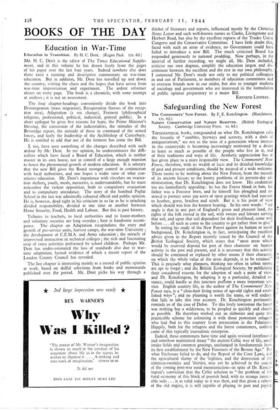BOOKS OF THE DAY
Education in War-Time
Education in Transition. By H. C. Dent. (Kegan Paul. rzs. 6d.)
MR. H. C. DENT is the editor of The Times Educational Supple- ment, and in this volume he has drawn freely from the pages of his paper over the last four years. Indeed nowhere else does there exist a running and descriptive commentary on war-time education. But in addition, Mr. Dent has travelled up and down the country, visiting the chaos and the hopes that have arisen from war-time improvisation and experiment. The ardent reformer shines on every page. The book is a chronicle, with some attempt at analysis ; it is not an assessment.
The four chapter-headings conveniently divide the book into Disintegration (mass migration), Recuperation (heroes of the recep- tion area), Adaptation (a sea change), Ferment (philosophical religious, professional, political, industrial, general public). In a short epilogue he gives five reasons for hope, the Prime Minister's blessing, the conversion of the industrialists, the stimulus of the Beveridge report, the attitude of those in command of the armed forces, and lastly the leadership of the Archbishop of Canterbury. He is entitled to add char out of the ferment has come the Bill.
I, too, have seen something of the changes described with such ardour by Mr. Dent. In my opinion, he underestimates the diffi- culties which have faced a Board of Education, which is neither master in its own house, nor in control of a large enough mansion to house the phenomenal growth of modern education. It is salutary that the new Bill gives the Board stronger control in conjunction with local authorities, and one hopes a wider view of what con- stitutes education. Mr. Dent's impatience with circulars on evacua- tion shelter% youth, meals, nurseries, is understandable, but he must remember the violent opposition both to compulsory evacuation and to compulsory attendance. The story of the bombed Poplar School in the last war admittedly coloured official and public opinion. He is, however, dead right in his criticism in so far as he is attacking divided responsibility, divided at one time or another between Home Security, Food, Health and Labour. But this is past history.
Tributes to teachers, to local authorities and to foster-mothers and voluntary societies are long overdue ; here is handsome recom- pense. The chapter on Adaptation recapitulates the story and growth of pre-service units harvest camps, the war-time University ; the development of C.E.14.A. and Army education ; the miracle of improvised instruction in technical colleges ; the rich and fascinating crop of extra activities performed by school children. Perhaps Mr. Dent has under-estimated the loss of standards also due to war- time adaptation, factual evidence of which a recent report of the London County Council has revealed.
The Dast chapter is interesting mainly as a record of public opinion at work, based on skilful selections from books and memoranda published over the period. Mr. Dent picks his way through a
thicket of literature and reports, influenced mostly by the Christian News Letter and such well-known names as Clarke, Livingstone and Herbert Read, but also by the excellent reports of the Trades Union Congress and the Conservative Committee. I have little .doubt that, faced with such an array of evidence, no Government could have failed to introduce a new Bill. The much criticised Board has responded generously to national prodding. Now perhaps, in the interval of further recording, we might all, Mr. Dent included, criticise our own dogmas, simplify the education jargon and dis- criminate between the excellent and the rest in our own philosophy. I commend Mr. Dent's study not only to my political colleagues in and out of Parliament, to members of education committees and to overseas friends now in our midst, but also to younger students of sociology and government who are interested in the formulation of public opinion preparatory to a major Bill.
KENNETH LINDSAY.


























 Previous page
Previous page